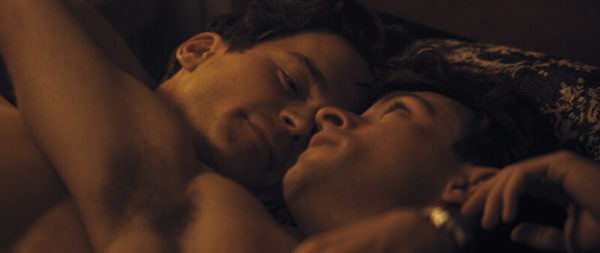
Each week Joe and Terry discuss the most recent episode of Showtime’s adaptation of Fellow Travelers, alternating between our respective sites.
Spoilers follow for Episode 1 “You’re Wonderful”
TERRY
When I started watching Fellow Travelers, I knew it would be a sad journey through a decades-long romance between two men who had to keep their sexuality and their romance secret. What I didn’t expect was that series creator Ron Nyswaner’s show would be both a historical reminder of how far society has progressed, but also how familiar the struggles still are.
Sure, we can discuss the way in which religious bigotry ran the country and led to persecutions and more in the mid-to-late 1900s. Or how the show gives young queer people insight into how bad things were just 30-70 years ago.
But Fellow Travelers also comes at a time when the younger generation–at least on social media–bemoans sexuality. Between prudish thoughts on Pride to debates on sex in movies, Nyswaner’s adaptation of Thomas Mallon’s novel feels both timely, as well as historical.
I should have expected it, honestly. Nyswaner is, of course, best known for writing Philadelphia, which tackled the AIDS epidemic at a time when public opinion about queer people was incredibly ill-informed. He also wrote Soldier’s Girl, the 2003 true story about a soldier who fell in love with a trans night-club performer. Fellow Travelers feels like a perfect continuation of the lives and relationships Nyswaner has been interested in exploring.
And if “You’re Wonderful” is any indication…well, Joe, I think we’re in for an emotional, sexy and heartbreaking ride.
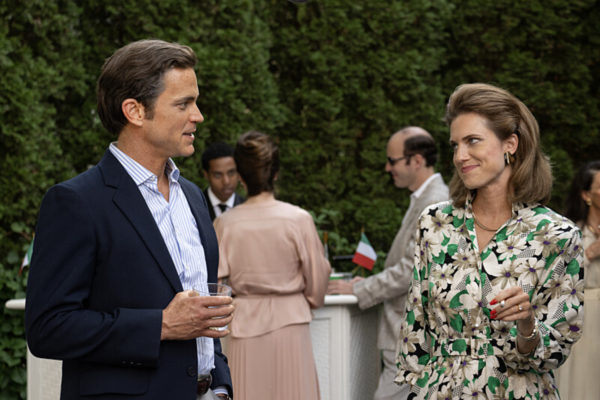
The first episode begins in the 80s and introduces us to Hawkins “Hawk” Fuller (Matt Bomer), who appears to be happily married to Lucy (Allison Williams). The reverie is quickly dissipated by the arrival of Marcus (Jelani Alladin), a man from Hawk’s past who brings with him a glass paperweight of Washington DC. Away from the crowds, Marcus informs him that Hawk’s former lover Tim Laughlin (Jonathan Bailey) is dying of AIDS in San Francisco but doesn’t want to see him.
“You have a beautiful family, a beautiful life. I hope it was worth it,” Marcus tells him and immediately we’re swept back to 1952 where Hawk and Tim have a flirtatious meet cute on election night. Tim is introduced attempting to get a glass of milk from the bartender. The name of the show is heard in the background as someone makes a comment that the new president doesn’t want “fellow travelers” at the same time as Tim and Hawk basically eye-fuck each other at the bar. They are a pair of star-crossed lovers. Hawk works for a democratic senator who wants to destroy Senator McCarthy while Tim is wide-eyed and naively afraid of communism and the soviets.
After the event, Hawk cruises a gay spot and hooks up with Eddie (David Tomlinson) who, it’s revealed, also works for the government. It’s here that Fellow Travelers begins to show us its steamier side with hair-pulling and ass-slapping sex. Later, Hawk runs into Tim again and while he is infatuated with the younger man, he also is thinking about how he can use the waifish man to further his political career.
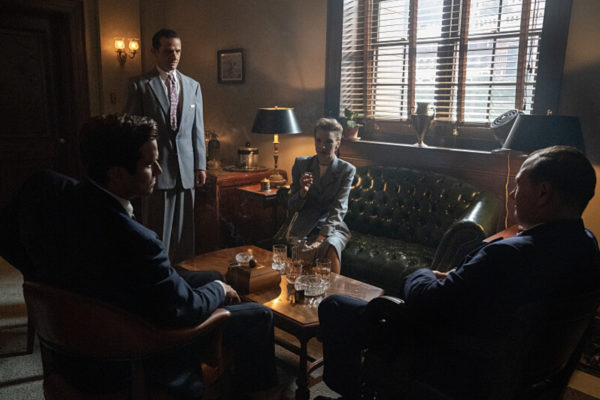
What follows is a very dense pilot episode that introduces us to the conflicting personalities and relationships among the political elite of Washington. Hawk is an intriguing individual: a war hero who has the scars and medals to prove it, as well as an apartment that oozes status.
In one meaningful conversation, his colleague George Bauers (Jameson Kraemer) complains how well-positioned Hawk is in Washington. “You’re lucky. You’re bulletproof,” he tells Hawk while fearfully explaining that he was caught at a gay bar and is being blackmailed to snitch on other gay men to save his hide. Meanwhile Hawk obviously still has to hide his sexuality, but he barely seems affected by the witch hunts targeting “deviants and subversives” and tends to parade his sexuality around.
He’s a lion on the hunt and Tim is the gazelle he has his eye on.
There’s a whole lot more in this episode, so let me turn it over to you for your initial thoughts. I’m not familiar with the novel, so I’m curious if you are? What are your initial thoughts about this episode? What are your thoughts on how “You’re Wonderful” introduces us to the main characters and the political environment of the time? This might sound silly, but as a Canadian are you familiar with the United States’ political environment in this time period? And, woof, can we talk about the steaminess?
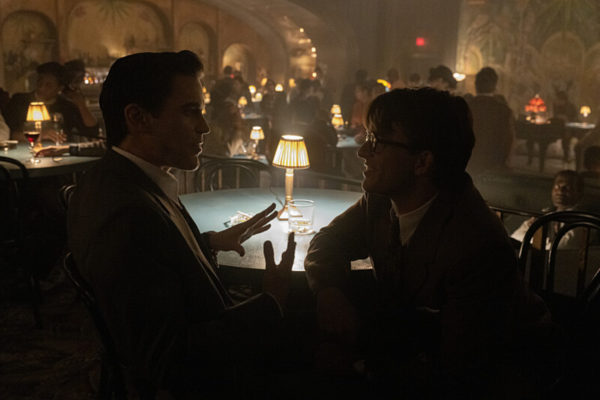
JOE
Yes, plenty to unpack!
I’m not familiar with the novel, except to say that the reaction online when the adaptation was announced with these two fantastic “out” queer actors was very warm. So I gathered that it was beloved.
While I knew that the series would span decades, I didn’t realize that it was directly tied to Senator Joseph McCarthy (Chris Bauer)’s hearings into communism, which extended to include queer people. The politics of this era aren’t a well known fact here in Canada, though I do know all about it in large part thanks to Karina Longworth’s podcast, You Must Remember This. Her angle is obviously Hollywood-specific, but the season entitled “The Blacklist” dealt with the inquests and how they irrevocably shifted both the power and the lives of the individuals who came under suspicion.
So when Hawk gives up Eddie to help George, it’s a really grave situation. I’m sure Fellow Travelers will explore the fall-out in greater detail, but in the moment it’s clear that Hawk is more comfortable throwing a young man who doesn’t understand the social etiquette of cruising under the bus for his more affluent and established colleague. In reality, Hawk just ruined Eddie’s life…at least for the immediate future (some who suffered under McCarthyism recovered their careers down the line, but many did not).
I’m glad that politics are such a key part of the series, because I’ll confess that the dual timeline structure doesn’t work for me. Not only am I exhausted by AIDS narratives within queer media (the Philadelphia connection is telling), but I’ve grown to detest this type of storytelling. It’s not quite in media res, but I would have much preferred not to have the 80s portion of the story included here at all. While at times the cross-cutting between the two time periods allows for an effective contrast, more often it robs the story of any mystery or question of where things will go.
By framing the story this way, it shifts Fellow Travelers from a romantic period drama to a tragedy spread across thirty years. I imagine I’ll be more forgiving of the series now that I know to expect it, but yeah, my initial reaction was one of frustration/annoyance.
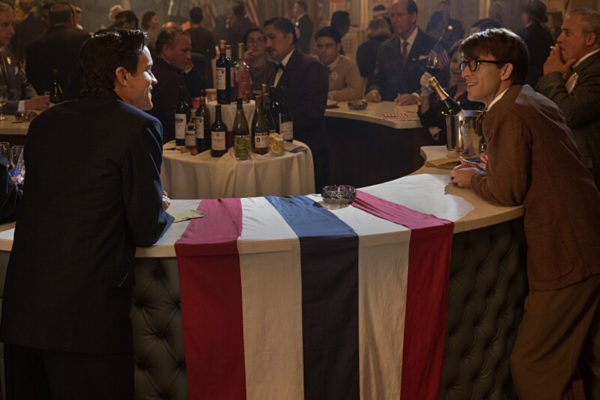
But let’s focus on the positives, which definitely includes several scenes of frank sexuality. You’re absolutely right, Terry: this is hot. What’s interesting about the different sex scenes is how much they reveal about Hawk: in his interaction with Eddie (light kink/dom with the ass slapping) to his scenes with Tim (ordering the more submissive religious man to remove his socks and suck on his toes; essentially making Tim beg to suck his dick to gain an invite to a political party) it’s clear that Hawk likes to be in control.
Sidebar: I never knew how much I needed to hear Jonathan Bailey say the words “I’m your boy, right?”
Hawk’s need to control everything, including sex, isn’t subtle, but it’s a smart way to establish who this character is and who holds the power in their relationship (for now). This will change and evolve over the course of the series; when Hawk arrives in San Francisco to visit Tim at episode’s end, their roles have reversed and Hawk is now the one calling from the diner for permission.
I wonder, Terry, how do you feel about the depiction of religion on the series? Tim’s defining character trait, aside from his boyish naivety, is his staunch Catholicism. We see him grappling with his desire to fuck Hawk and, later, be in a relationship with him and how that equates to a mortal (carnal) sin. I particularly liked the moment late in this first episode when the priest (Tony Munch) encourages him to confess, but Tim explains that sex with Hawk made him feel pure, so how can he be sorry for it?
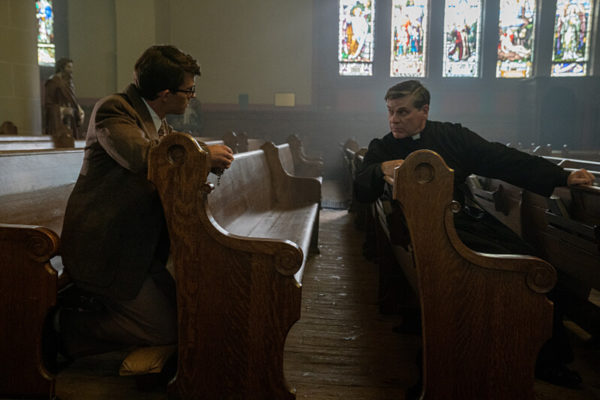
As a staunchly un-religious person, this struggle is completely beyond my own experience, but I appreciated its inclusion as a potential source of conflict. It also gave Bailey more to play with.
As it stands, this is Bomer’s episode and he does well with it. Both he and Bailey are excellent; they’re definitely the selling feature for Fellow Travelers so far. I’m hoping that the show will get a little more visually interesting because while Daniel Minahan’s direction is *fine* and the production looks expensive, I was hoping for a little more extravagance and flair.
Overall “You’re Wonderful” is a solid introduction to the characters and the story, but it’s not particularly exciting from a direction or cinematography sense.
Terry, back to you: did the two timeline structure bother you at all? What do you suppose is Marcus’ role in all of this drama? Did you like the scenes set in the queer speakeasy and how it contrasted the party? How did you like the small moments of foreshadowing such as office assistant Miss Addison (Keara Graves) discovering “artistic” Tim’s dedication in the Wolfe novel? Or did those moments feel too heavy handed?
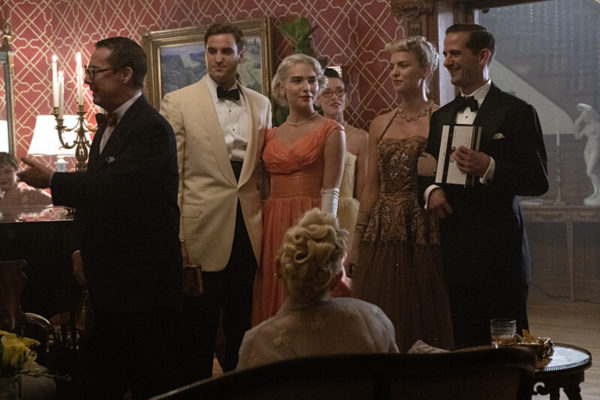
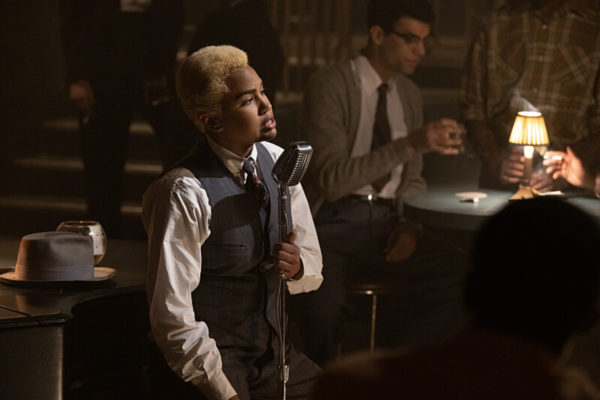
TERRY
It’s fascinating, Joe, because I literally just started listening to the audiobook version of Fellow Travelers (released to coincide with the Showtime series) and I’m immediately struck by the dissimilarities between the two, at least initially.
I don’t plan on contrasting the two as we go forward because I want to explore this show as its own vehicle, but the book does begin in 1991 with Hawk. Unlike the show, Marcus does not show up to tip him off that Tim is dying. Instead, he gets a letter informing him that Tim has passed away. And it’s that letter that brings us back to the 50s. Most interestingly, though, it begins by telling us about Tim and what drives him as opposed to following Hawk as he meets Tim at the election party.
I bring this up because the novel does a better job of exploring both men from the start, as opposed to this first episode which, as you pointed out, is Bomer’s episode. I’m curious if Fellow Travelers will dive more into Tim’s life and background because while I’m fine with the timeline structure, I did find Tim’s characterization to be a little too heavy-handed, to borrow your wording.
He’s naive. He doesn’t know what Washington is like. He believes in a God that, according to his religion, hates him. He’s a right-wing closeted gay who would totally have voted for Trump. He drinks milk at a bar, for crying out loud!
Hawk, meanwhile, doesn’t seem to have much in the way of political affinity, even though he’s working for Senator Smith (Linus Roache), a man who wants to take McCarthy down. I’m sure that politics will eventually shape the way the two men see the world, but right now they are a bit thinly drawn. It’s mostly the chemistry and the performances between the two men that elevates their characters.
To briefly answer your questions, the queer speakeasy brought me so much joy, particularly as it’s juxtaposed with the boring political party Hawk and Tim flee from. It’s a bastion of freedom where queer people can just be without judgment, fear and oppression. Of course it’s tempered by the fact that the bartender reminds us – and the characters – that there’s a red button that, if pressed, requires everyone to code switch back to “straight” before the cops arrest them.
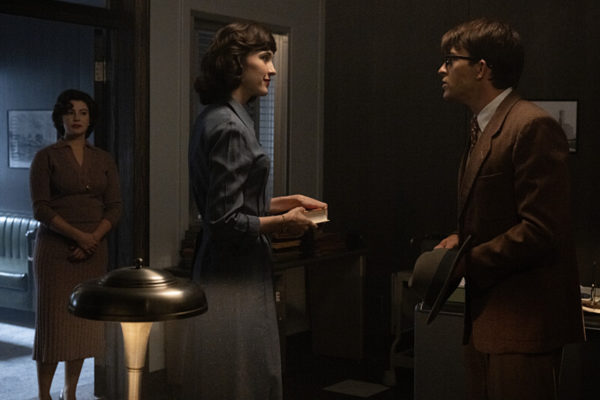
You talk about foreshadowing with Little Miss Rightwinger Addison and her discovery of Tim’s inscription, but that red button at the speakeasy also hangs over the first episode like a pall. I anticipate drama coming down the line, both from Miss Addison but also from the speakeasy.
As for Marcus, I think he’s the most intriguing character so far because here’s another closeted queer man working as a reporter…whose job is to uncover secrets and truths and write about them. I’ll be curious to see how his role develops.
But take us home, Joe. For an episode that lived in the sexuality between the two characters, did the ending scene of the two of them holding each other in fear make you nervous for what’s to come? You discussed the light kink/domination/submission the episode explored, but that ending scene felt a lot different…do you agree and have thoughts on it? And with a story spanning decades over 8 episodes…what do you hope the show will explore and will it be possible to tell it without feeling rushed?
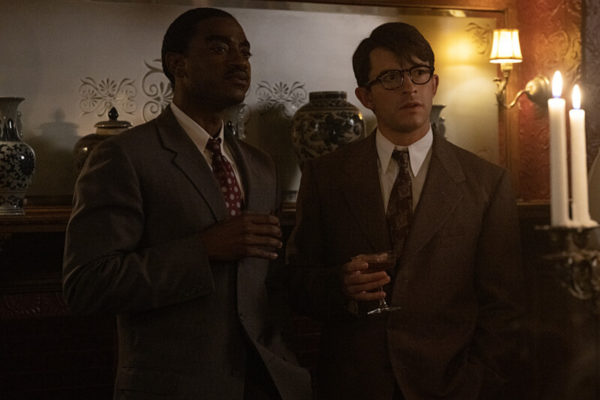
JOE
Yeah, you’re absolutely right about that the final scene. It simultaneously anticipates the political upheaval threatened by President Eisenhower’s new Executive Order (courtesy of McCarthy) which introduces wide-sweeping investigation and surveillance measures, as well as the spectre of AIDS that we already know is coming for Tim.
More than that though, the ending is also a completely different scene for Hawk and Tim, if only because they are on equal footing. Hawk is less afraid of commitment, while Tim has, by this point, kinda blown off his religious fears. And it is tender; here is where we really see the kindling of a blossoming love affair that will span decades, not just the lust and desire we saw in their previous sex scenes.
It’s a good place to end the episode: ideally by this point we, as an audience, are as invested in their love affair as we are in seeing these two smoking hot actors bang each other.
As for the question of being rushed, I do wonder how much time we’ll spend on any given decade/time. The temptation with period pieces is to fold in significant world events to help ground the fiction in reality, though that can sometimes make the narrative feel constrained. I do think we’ll see some fairly substantial time jumps as we move forward, with events like Hawk’s marriage to Lucy and the birth of his daughter, as well as the dissolution of his relationship with Tim, who we know moves halfway across the country.
As you suggested Terry, I do hope we also switch up the focus so that we can get to know more about Tim, and maybe even Marcus and Lucy, not just from Hawk’s point of view. Hawk is a very specific kind of character but I feel like I already understand a great deal about him and (to a lesser extent) Tim. Now I want to see more nuance and richer characterizations.
Just please don’t turn this limited series into queer Forrest Gump!
We’ll find out where episode two goes next week when we hop over to Gayly Dreadful to discuss “Bulletproof.”
Fellow Travelers airs Fridays on Showtime
